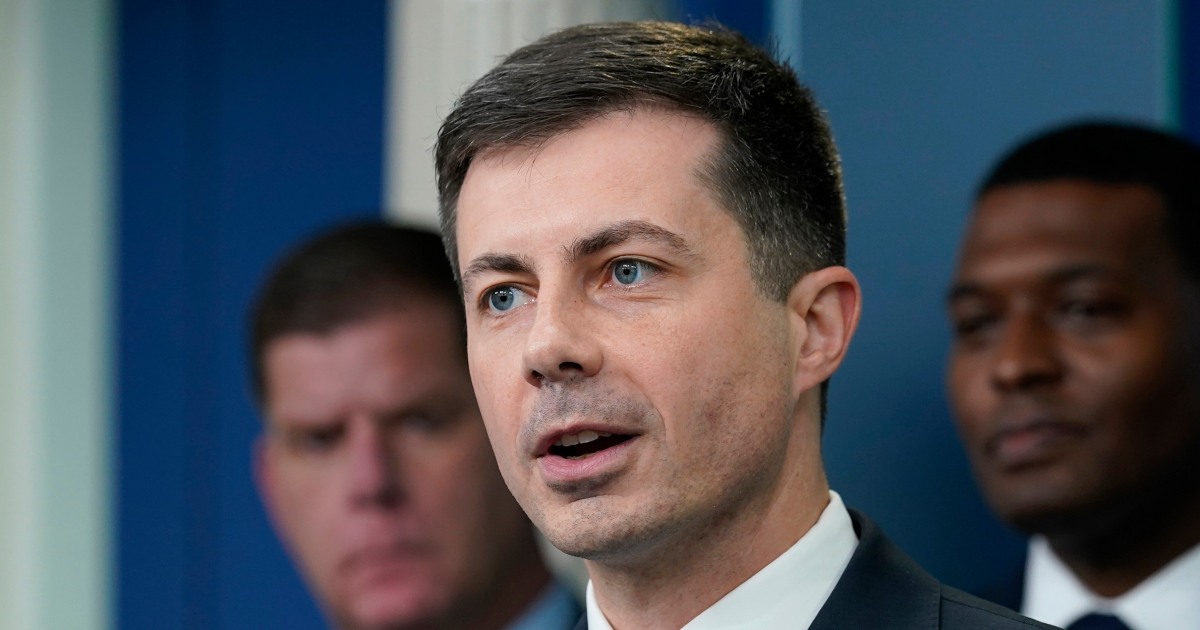
WASHINGTON — Air travel stinks right now, creating just the kind of crisis that a politically adept and ambitious Transportation secretary might turn to his advantage.
Americans want someone — anyone — to fix the problems: delays, cancellations, skyrocketing ticket prices.
The stakes could hardly be higher for the official tasked with finding solutions: Pete Buttigieg, the 40-year-old former presidential candidate and mayor of South Bend, Indiana. Flying fiascos represent the first major test of whether he’s competent enough to lead an agency that dwarfs the small-city government he once ran. Compared to South Bend, DOT has roughly 50 times the workforce and a budget that is 370 times larger. And his performance, under scrutiny from former rival Sen. Bernie Sanders, I-Vt. and others, promises to shape his future within the Democratic Party.
“You have a mayor of a small city with a tiny public transportation department now responsible for transportation in a country that is huge,” said Ari Rabin-Havt, a former top Sanders aide. “And the question is, is that an appropriate qualification?”
The turbulence is a plot twist for Buttigieg, one of the most high-profile members of President Joe Biden’s Cabinet. Up to this point, he’s capitalized on his position and proved to be an asset inside an administration where overall approval ratings are hitting record lows. Buttigieg has maintained a robust television and social media presence, reassured Black communities that were cool to him in his 2020 presidential bid, and crisscrossed the country promoting an infrastructure package that was Biden’s signature achievement. Because he is so recognizable and his name so often floated as a possible 2024 contender should Biden not seek re-election, virtually everything Buttigieg does gets outsize attention. If he can somehow curb the spate of flight delays and cancellations, he would give Biden a sorely needed boost — while giving his own executive credentials more heft.
The Cabinet post that Buttigieg landed after Biden’s victory in 2020 “is all upside,” said Steve Elmendorf, a former Democratic House leadership aide and Buttigieg campaign supporter. “Unless you screw it up.”
There’s no single cause for the problems aggravating flyers. Carriers are facing a shortage of pilots, while the federal government has struggled to fully staff security checkpoints, creating long lines for passenger screening. Covid-19 lockdowns created a pent-up demand for travel that the aviation industry has struggled to meet.
Sanders, who hasn’t ruled out a third run for the presidency, sent Buttigieg a pointed letter last month pressing him to take “immediate action” to curb flight delays and protect the rights of passengers.
“Taxpayers bailed out the airline industry during their time of need,” Sanders wrote. “Now, it is the responsibility of the airline industry and the Department of Transportation to ensure, to the maximum extent possible, that the flying public and crew members are able to get to their destinations on time and without delay.”
Sanders released the letter publicly, and Buttigieg called the senator privately to say that his department would look into his suggestions, a person familiar with the call told NBC News.
Transportation officials say that Buttigieg is taking many of the steps that the crisis warrants. They point to efforts to demand better customer service, including prompt cash refunds, and say the DOT’s consumer protection team has expanded dramatically, while acknowledging there is still a backlog. Buttigieg also has offered to work closely with airlines to identify solutions and has talked of promoting programs to train a younger generation of pilots.
“The department expects that when Americans buy an airline ticket, they’ll get to where they need to go safely, affordably and reliably,” said Ben Halle, a department spokesperson who worked on Buttigieg’s presidential campaign. “DOT’s collaboration with the airlines has contributed to some positive steps, including the airlines setting more reasonable schedules, increased focus on customer service and increasing worker pay to improve recruitment. The secretary has and will continue to take action to protect the rights of airline passengers and consumer rights and when airlines fail to meet their responsibilities, they will be held accountable.”
Among the federal departments, Transportation has historically been a bit of a backwater — heavy on workload and traditionally light on opportunities to shine. Buttigieg, by contrast, has the good fortune of running a department whose work is central to the president’s biggest achievement to date. His department gets to disperse billions of dollars in highway, rail, aviation and other public construction projects funded by a historic infrastructure spending package that Biden ushered into law last year.
But Buttigieg is also a telegenic messenger whom the White House deploys for other purposes. He often appears on the news with the White House’s full blessing and may step up campaign work this fall for Democrats. He made 15 regional TV appearances from June 1 to mid-July, according to the White House, more than any other Cabinet member. (He ranked fourth in national TV appearances among the Cabinet in that span; the White House did not supply a longer time period.)
He looks for ways to interweave his personal story and the job at hand. This month, after one of his own flights was canceled, Buttigieg shared his ordeal on Twitter, encouraging passengers to know their right to seek cash refunds rather than accepting travel credits. And last week he showed up on “Fox News Sunday” to discuss the growing frustrations with air travel. The interview went viral — not because of anything Buttigieg said about air travel, but because of his comments supporting those who peacefully protested outside a steakhouse where Supreme Court Justice Brett Kavanaugh was dining.
In Oval Office sessions, Biden has been known to tease him: “How’d you get off of TV and into this meeting?”
What’s needed now, though, is not a messenger to spar with Fox News hosts, but a hard-nosed administrator willing to use every tool necessary to limit flight disruptions, passenger advocates say. While Buttigieg’s power to stop delays is limited, Sanders recommended a few steps in his letter: Buttigieg should fine airlines for scheduling flights they cannot fully staff; fine them for flights delayed for more than two hours; and demand that they give refunds for flights delayed more than an hour, as European rules currently require.
“He’s the only sheriff that the airline passengers have,” said Bill McGee, a senior fellow for aviation at the American Economic Liberties Project, a nonprofit focused on consolidation and fairness in the corporate world. “If Pete Buttigieg doesn’t stand up and fight for air travelers, they’re out of luck. That’s the reality.”
Buttigieg could force the airlines to be more transparent about their flight records and crew staffing, McGee said. Instead, Buttigieg has taken a softer approach to the industry, chiding airlines in some instances and sitting down with them in others. Sanders wrote approvingly in his letter that Ray LaHood, Barack Obama’s first transportation chief, took aggressive action when unhappy passengers were stuck for hours on planes that hadn’t left the tarmac, enforcing a new rule that fined airlines up to $27,500 per passenger in such cases.
Crises come and go these days and there’s always the possibility that Buttigieg won’t endure lasting blame if the airline industry recovers.
“People move on very quickly because in the airline industry, there’s a new story every day,” said Sara Nelson, president of the flight attendants union. “But what’s going to last is the connections he made every day on the job.”
Some of the political advantages coming his way are the envy of potential rivals. A part of Buttigieg’s job is cutting ribbons and announcing grants underwritten by the $1 trillion infrastructure bill. He turned up at Los Angeles International Airport this month to showcase a $50 million grant to improve surrounding roadways and parking areas.
Some of Vice President Kamala Harris’s supporters have voiced resentment over his role, complaining that while he gets popular assignments like doling out grants, she was given the thankless task of helping to solve the border crisis.
He has also used the job to build bridges of the metaphorical kind, potentially giving him an edge in future Democratic contests. Buttigieg gained little traction with Black voters as a presidential candidate, but as a Cabinet secretary, he’s done extensive outreach to Black constituencies, giving speeches promising to end racist road and transit policies that left minority neighborhoods isolated.
“He is a clear leader now and will only grow in stature, especially because of his performance as secretary of transportation,” said Sen. Richard Blumenthal, D.-Conn. “Consumers are smart enough to see that the problem is really the airlines. They are, after all, the ones responsible for the planes, staffing, cancellations, bad practices and abysmal management.”
White House officials seem pleased with Buttigieg’s performance.
“Obviously Pete is a very gifted messenger who we believe does a great job on behalf of the administration,” said one White House source unauthorized to speak publicly on the matter. “Even with media hits and his travel, I think people try to extrapolate some sort of political agenda, but his media appearances and travel are all done in collaboration with the White House, as it is with every member of the Cabinet.”
The source added that Cabinet secretaries across the Biden administration, including Gina Raimondo at Commerce and Jennifer Granholm at Energy, have also been dependable spokespersons on TV while acknowledging that issues such as infrastructure, supply chain challenges and airline scheduling woes have put Buttigieg in a “unique position.”
As for Harris and Buttigieg, both sides deny any ill will — and any hint that Biden won’t seek re-election. The past and perhaps future presidential rivals are working collaboratively, their allies say.
This month, Buttigieg sat down with one of Harris’ closest confidantes, former Democratic National Committee Chair Donna Brazile, in New Orleans. He was in town to speak at the Essence Festival of Culture, a tribute to Black culture and community.
Over lunch at Cochon Butcher — oysters for Brazile, muffaletta for Buttigieg — they talked about infrastructure, Black entrepreneurial opportunities and politics, Brazile recalled. One other topic was the upcoming July Fourth holiday and the potential for major airline snafus. Buttigieg grasped the peril and mentioned a conference call he had had with airline executives, she said.
Brazile asked how he had heard about the restaurant, which he had picked and which is near her home.
Harris told him about it, he said.
Brazile said Harris and Buttigieg are on good terms.
“They all talk,” she said. “Trust me.”
Source: | This article originally belongs to Nbcnews.com









